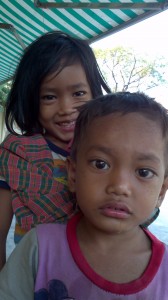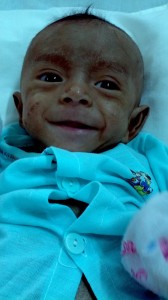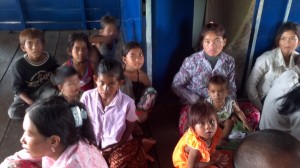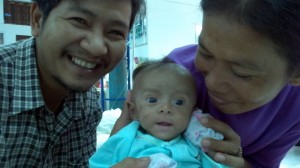 I knew better. I had read the books on Cambodian culture. I knew how I was supposed to behave while working in there. For example, from the book Culture Smart: Cambodia:
I knew better. I had read the books on Cambodian culture. I knew how I was supposed to behave while working in there. For example, from the book Culture Smart: Cambodia:
Any difference of opinion or any criticism must be conveyed in indirect and respectful terms…Confrontation would be counterproductive, and it is you who would lose face and respect…It is not polite to get straight down to business…Keep your remarks favorable and uncritical…Cambodians conceal anger and frustation, often behind a smile that may indicate incomprehension, disagreement, nervousness, or irritation…The Cambodian approach may appear frustrating, time-wasting, and indecisive, but speaking frankly and forcibly…will be counterproductive.
I thought I could be demure. I thought I would be able to spend a week or two of my four weeks just watching and asking questions. I thought I could wait to question decisions, suggest changes, and make plans until I had gained trust and respect. Turns out, I couldn’t.
On the first afternoon while on ward rounds I questioned the chief doctor in front of all of the residents. He wanted to get an x-ray that would be considered unnecessary in the States. The residents actually agreed with me so I kept arguing the point. After two or three minutes I realized I was being stupid. I found a way to save face and agree with the chief. He, luckily, forgave me. He must be used to the volunteers.
My goal in volunteering at the hospital was to help with quality improvement. After only one day reviewing charts I had my project.  I had decided that the medical team needed to work on discharge planning and toward shorter lengths of stay. All kids need to spend the minimum amount of time possible in the hospital. Hospitals are not safe places unless you absolutely need them. There are nasty germs and big needles. In Cambodia I jumped in and started talking to everyone I could about how to reduce the length of stay. I ran to the library to look up information, filling my time with useful work. It took me about a week to realize that a sick Cambodian kid has different needs than a sick American kid. In Cambodia, the hospital just may be a safer place to recover than home. It was a complex problem that needed more insight than I could gain in four weeks.
I had decided that the medical team needed to work on discharge planning and toward shorter lengths of stay. All kids need to spend the minimum amount of time possible in the hospital. Hospitals are not safe places unless you absolutely need them. There are nasty germs and big needles. In Cambodia I jumped in and started talking to everyone I could about how to reduce the length of stay. I ran to the library to look up information, filling my time with useful work. It took me about a week to realize that a sick Cambodian kid has different needs than a sick American kid. In Cambodia, the hospital just may be a safer place to recover than home. It was a complex problem that needed more insight than I could gain in four weeks.
So I changed my plans and quickly latched onto a new project. The mortality numbers had just come out. In reviewing the numbers it was noted that kids were sick for awhile before any action was taken. This is a common problem not unique to Cambodia.  I wanted to introduce a pediatric early warning system which is used in hospitals around the world. I presented the basic idea to the Cambodian chief doctors and charge nurse. After an hour of talking, the new system was rejected. Not hands down, mind you. It’s not done that way in Cambodia. But respectfully, with a lot of thank yous, saying that all the decisions needed to go through the proper channels. It would need further approval. This was not a decision they alone could make. Maybe after review it will get implemented. Just slowly. After I’m gone.
I wanted to introduce a pediatric early warning system which is used in hospitals around the world. I presented the basic idea to the Cambodian chief doctors and charge nurse. After an hour of talking, the new system was rejected. Not hands down, mind you. It’s not done that way in Cambodia. But respectfully, with a lot of thank yous, saying that all the decisions needed to go through the proper channels. It would need further approval. This was not a decision they alone could make. Maybe after review it will get implemented. Just slowly. After I’m gone.
Actually, that meeting didn’t bother me much. I don’t mind my projects being rejected or delayed. I was really frustrated, however, when my suggestions on patient care were rejected. I tried so hard to convey my concerns about a child who’s status never improved during my time in Siem Reap. I don’t know if the junior doctors ever really understood my concerns. Maybe they couldn’t understand my English. They smiled and nodded their heads, but little change ever happened. And I didn’t have the insight to realize that the vice-chief might not really understand the problem I believed the child to have. I didn’t have his trust to get him to listen closely to my thoughts. Every suggestion was met with rebuttal. The child’s care did not change during my visit.
 I love the practice of pediatrics. I love the perfect little bodies and the smiles. Pediatric physiology fascinates me. I love thinking through the problems and questioning the answers. I get very excited when caring for a sick child (odd, I know). I love the teamwork that’s involved between the nurses, the doctors, and the parents to make a child well again. I jump in when there is a problem to be solved. Unfortunately, I forgot what the book told me about Cambodia, “It is not polite to get straight down to business.”
I love the practice of pediatrics. I love the perfect little bodies and the smiles. Pediatric physiology fascinates me. I love thinking through the problems and questioning the answers. I get very excited when caring for a sick child (odd, I know). I love the teamwork that’s involved between the nurses, the doctors, and the parents to make a child well again. I jump in when there is a problem to be solved. Unfortunately, I forgot what the book told me about Cambodia, “It is not polite to get straight down to business.”  I needed to spend more time just watching, being around, listening, and getting to know the medical staff. Sitting in the ward, feeling bored and unproductive, but watching and being watched might have been the most useful way to actually get something done in the end. In Cambodia the question is not whether to jump in feet first or cannonball. The question is just how quickly to wade in.
I needed to spend more time just watching, being around, listening, and getting to know the medical staff. Sitting in the ward, feeling bored and unproductive, but watching and being watched might have been the most useful way to actually get something done in the end. In Cambodia the question is not whether to jump in feet first or cannonball. The question is just how quickly to wade in.

2 Responses to Working in Cambodia